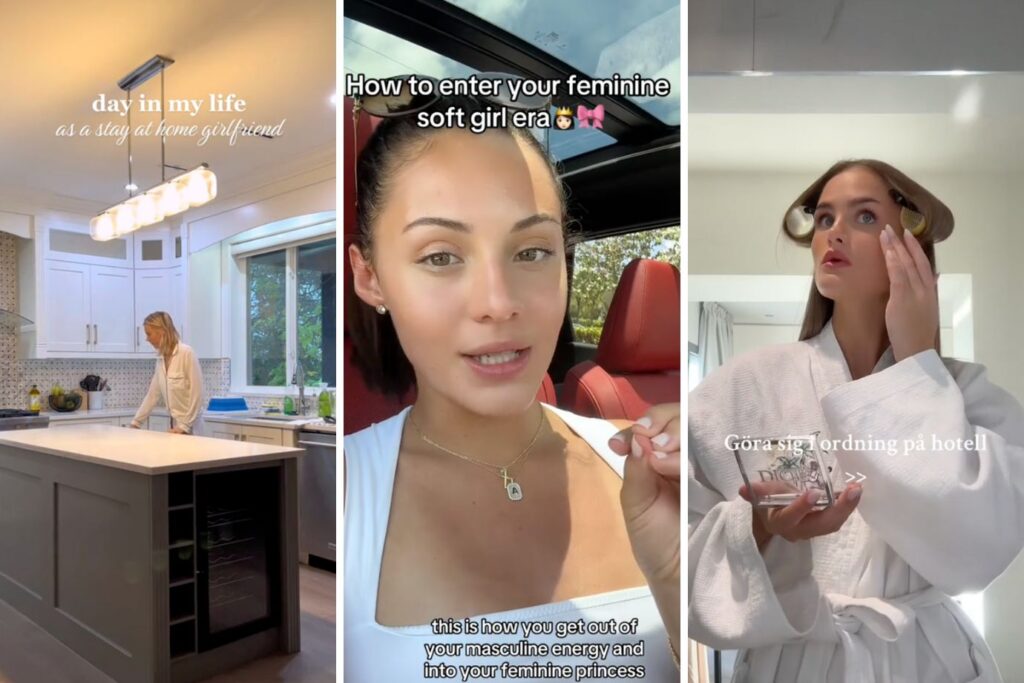Ari used to be a “tomboy”. She played basketball and tackle football and really embraced her “masculine energy”.
Now known as Earth Angel Ari on the internet, these days Ari embodies the identity of what has been dubbed as the “soft girl” – a feminine, peaceful, blasé kind of woman.
And for just $24.99, you can be a soft girl too!
“I just feel like life is so soft and feminine, like men do everything for me, my boyfriend gives me princess treatment all the time,” Ari says in a video, which has been viewed more than 188,000 times.
“This is completely transforming girls’ lives.”
Ari is selling her “Princess Treatment Formula”, a step-by-step guide on how to metamorphose yourself from a tough, bold and brazen woman into a soft girl. It includes scripted lines on how to talk to men, styles guides, and tips on how to “tap into the universe’s abundance… to manifest money and free things out of thin air”.
“Receive praise, privilege and princess treatment,” the product description says on her website. “Learn how to attract privilege, a provider-man, exclusive opportunities and free things in your feminine energy.”
Ari is literally selling the soft girl lifestyle, and while I have no doubt she wouldn’t be the only one, there are hundreds of other content creators online showing off just how good their lives are – quitting their jobs, taking care of the home, letting men provide for them.
Kendel Kay is a stay-at-home girlfriend and content creator on TikTok. In a video that has been watched a million times, she gives us a “day-in-the-life” insight.
Kendel wakes up, takes an aloe shot and her “greens” (a green powder she mixes with water).
“Then I get straight to making Luke’s coffee (her partner), because he’s definitely a caffeine first thing in the morning kind of guy,” she says.
Kendel journals, reads, then starts her I-can’t-count-how-many-steps skincare routine. As she is making her breakfast – oats and berries – she is interrupted by Luke, who wants another coffee. Right away, darling.
Kendel goes to the gym and does some online shopping. And around all that, she makes the bed, does the dishes and two loads of laundry, before calling it a night.
Her video – and her entire social media account – gives off the impression that she has not a care in the world, and it’s intoxicating. I even find myself thinking: imagine if I had all that time just for me. If I quit my job, then yes, I’d have time for the gym, finally. I could also have a zillion-step skincare routine and maybe my skin wouldn’t break out as much. I too could drink matcha.
At the same time, I’m almost expecting the women in these videos to tell me they’re joking. To break the fourth wall, wink and whisper to the camera, “don’t worry queen – did you think I was seriously doing this?”
I guess I’m hoping they are choosing this lifestyle just to get back at the patriarchy, to financially take advantage of a system that has oppressed women for centuries.
But the truth is, many women actually believe in this lifestyle. And it’s not just in places where women’s rights are under threat like, arguably, in the US.
In Sweden, one of the most gender-equal countries in the world, a survey on young people in August this year found 14 per cent of girls aged 7-14 identified as “soft girls”.
And the reason? Social media. Researcher at Ungdomsbarometern Johanna Göransson said social media is leaning away from the “girl boss” identity, and more towards this softer, feminine lifestyle.
“Work doesn’t really feature that much if you look at lifestyle content on social media today, it’s much more about exercise and wellness,” Göransson told the BBC.
“And if that’s the picture young people have of what a normal life looks like, then, of course, maybe you’re not so excited about spending eight hours in an office a day.”
Influencers like 25-year-old Vilma Larsson make the soft girl lifestyle so enticing. Just ask her 11,000 followers on TikTok.
“My life is softer. I am not struggling. I am not very stressed,” she told the BBC.
Earlier this year, Jessie Tu wrote a piece on Women’s Agenda about tradwives. It is similar to the soft girl trend in that TikTok tradwives stay at home, while their husbands provide for them. They cook, they clean, they dress up before their men return home from work.
So are these passing internet trends, like a viral dance or a song lyric or a funny video that gets shared over and over again?
Trends like tradwives and soft girls come and go, but they all share a common denominator – men’s dominance, women’s submission – which shows no sign of going away. It’s up to women not to fall for the trap, and save your $25.


